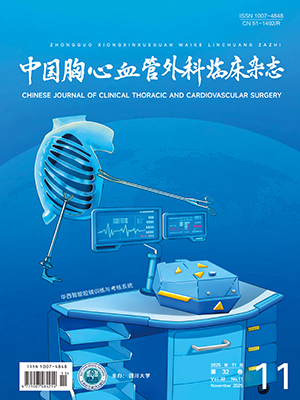| 1. |
刘建平, 付茂勇, 夏娟, 等. MTA1, VEGF-C 在食管鳞癌中的表达及与淋巴管生成的关系. 中国胸心血管外科临床杂志, 2016, 23(3): 268-273.
|
| 2. |
张艳姣, 许翠萍, 乔亚光, 等. CK15 在食管鳞癌患者组织及血清中的表达与意义. 山西医科大学学报, 2015, 46(8): 793-796.
|
| 3. |
毕良文, 张丽珍, 赵滑峰, 等. 多西紫杉醇加奈达铂同期适形调强放疗治疗食管癌的疗效中华肿瘤杂志, 2012, 34(9): 710-711.
|
| 4. |
泮卫红, 罗青峰, 陈惠馨, 等. 紫杉醇联合顺铂治疗晚期食管癌 20 例临床研究.中国医药导报, 2010, 7(26): 130-131.
|
| 5. |
刘沙, 王明坤, 张爽, 等. 多西紫杉醇联合奈达铂同步放化疗治疗局部晚期食管癌临床观察.现代中西医结合杂志, 2015, 24(30): 3351-3353.
|
| 6. |
刘阳, 赵妍, 袁翎, 等. 食管鳞癌患者预后因素分析.中华肿瘤防治杂志, 2016, 23(2): 91-95.
|
| 7. |
段星, 赵恩民, 丛铁川, 等. 颈段食管癌的外科 16 例临床分析. 临床耳鼻咽喉头颈外科杂志, 2013, 27(24): 1347-1350.
|
| 8. |
龙梦云, 韦诗友, 黄芊, 等. 两种食管上提径路对食管癌患者术后并发症影响的系统评价和 Meta 分析. 中国胸心血管外科临床杂志, 2015, 22(2): 91-99.
|
| 9. |
戚艳波, 李高峰, 万崇华, 等. 基于 QLICP—ES 量表的食管癌患者生命质量影响因素分析.重庆医学, 2015, 44(35): 4995-4997.
|
| 10. |
许正年, 胡长路, 胡冰, 等. 食管癌患者化疗后感染分析与预后研究. 中华医院感染学杂志, 2015, 25(21): 4941-4943.
|
| 11. |
吴志伟, 陈凯, 段卫明, 等. 凋亡抑制蛋白 XIAP 和 Survivin 在晚期胃癌中的表达及其与含多西紫杉醇方案化疗疗效的相关性.现代肿瘤医学, 2015, 23(6): 815-820.
|
| 12. |
刘尚国, 白玉, 赵宝生, 等. 复发转移食管癌患者的预后因素分析.中华肿瘤杂志, 2015, 37(2): 143-147.
|
| 13. |
梅静峰, 秦叔逵, 钱军, 等. 多西他赛联合顺铂治疗复发性中晚期食管癌贲门癌的临床研究.临床肿瘤杂志, 2013, 18(14): 272-273.
|
| 14. |
葛小林, 孙新臣, 李苏宜, 等. 低剂量多西紫杉醇对中晚期食管癌放疗增敏作用的近期疗效观察.海南医学, 2011, 19(13): 135-136.
|
| 15. |
Calpe S, Read M, del Carmen Sancho-Serra M, et al. Abstract C04: In vivo upregulation of bone morphogenic protein 4 (BMP4) in esophageal cancer is through tumor-stroma crosstalk. Cancer Research, 2016, 76(15 Supplement): C04.
|




